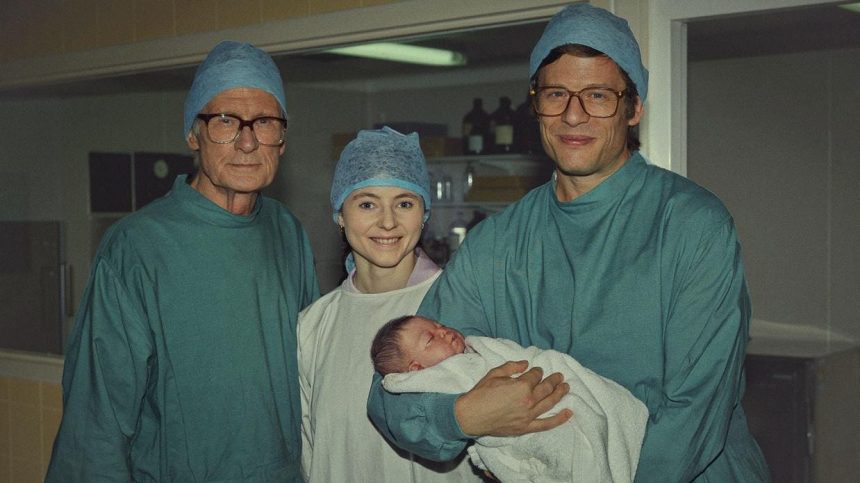Joy: Celebrating Pioneers of IVF and the Unheard Voices of Women’s Health
Directed by Ben Taylor, Joy centers on the groundbreaking work of three scientists instrumental in developing in vitro fertilization (IVF) during the 1960s and 1970s. The film showcases the experiences of surgeon Patrick Steptoe (played by Bill Nighy), scientist Robert Edwards (James Norton), and nurse-embryologist Jean Purdy (Thomasin McKenzie). While the contributions of Steptoe and Edwards to IVF are widely recognized, Jean Purdy’s invaluable role has often been overlooked in history, largely due to the male-dominated landscape of science during that era. Through Purdy’s perspective, Joy seeks to highlight her groundbreaking contributions and brings much-needed recognition to a woman who played an essential part in one of the greatest medical advancements of modern times.
The film poignantly grapples with the landscape of women’s health, presenting a narrative where many female patients are dismissed by their male doctors, deemed "too old" or not worthy of treatment. This disconnect resonates with contemporary audiences, invoking discussions about how women’s reproductive health issues have been historically marginalized. Purdy herself grapples with endometriosis, a debilitating condition linked to infertility, underscoring the challenges women faced in gaining access to effective healthcare. Through scenes that explicitly show the male-dominated medical establishment, Joy criticizes a system that often discount female experiences. A significant turning point occurs when Steptoe confronts a board filled with male doctors, challenging them to recognize the importance of their research on women.
Actors James Norton and Thomasin McKenzie reflect on the film’s relevance as a reminder of the progress that must still be made in the field of women’s health. McKenzie emphasizes the continued need for society to listen to women’s demands for agency over their own bodies, suggesting that storytelling plays a critical role in this ongoing struggle. Norton echoes this sentiment, citing how the medical establishment’s culture remains entrenched in its neglect of women’s healthcare issues, particularly with conditions like endometriosis that continue to be misunderstood or poorly treated. His observations shed light on the essential nature of Joy, not just as a historical retelling but as part of a broader dialogue challenging the status quo in women’s health.
In addition to their scientific endeavors, the pioneers in Joy faced societal pushback from religious institutions and media, adding layers of personal and professional turmoil to their journey. Purdy, in particular, was challenged by her mother’s staunch religious beliefs, while the media labeled Steptoe and Edwards as "Mr. and Mrs. Frankenstein," illustrating the societal tensions surrounding their work. This context adds emotional depth to the film, depicting the resilience required for Purdy and her colleagues to advocate for women’s reproductive rights in the face of significant resistance. Both McKenzie and Norton describe moments in the film where their characters’ authenticity and emotional struggles came to life, laying the groundwork for their performances and underscoring their commitment to portraying these real-life figures with respect.
The chemistry and friendship among the three protagonists form the emotional backbone of Joy, with the film emphasizing not only their scientific collaboration but their personal bonds. The friendship dynamics are crucial, showing how they supported each other through challenges and setbacks. McKenzie recounts moments with co-star Bill Nighy, engaging in meaningful dialogue that deepened her understanding of Purdy’s character. This interconnectedness reveals the importance of mutual respect and collaboration in driving scientific discovery, enhancing the film’s celebration of the team effort behind IVF’s creation.
As the narrative of Joy unfolds, the audience learns about the ongoing struggle for recognition that Purdy faced within her lifetime and beyond. The film concludes with the revelation that Jean Purdy’s contributions were not acknowledged on a commemorative plaque honoring Steptoe and Edwards until years after her death. Norton’s reflections on this exclusion reveal the inequities women have historically faced in gaining recognition for their work. He highlights the palpable bond between Purdy and Edwards and acknowledges the importance of their work, noting how significant parts of their contributions have been neglected by history. Ultimately, Joy not only memorializes the groundbreaking advances in reproductive technology but also serves as a call to continue advocating for women’s rights and health, ensuring that figures like Jean Purdy are not forgotten.



